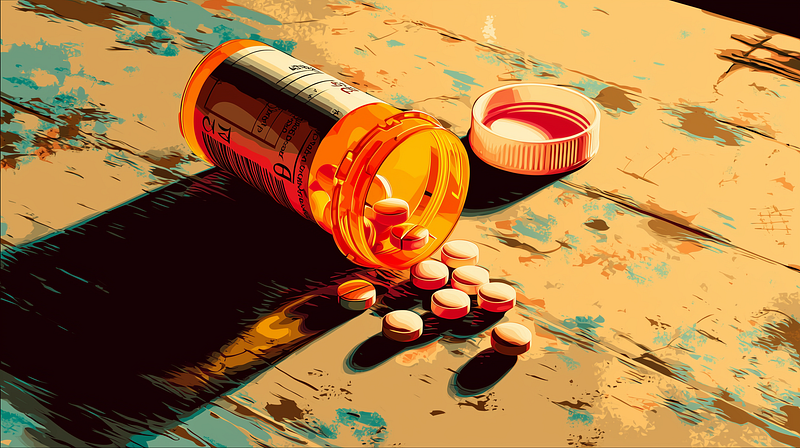The Drugs That We Don’t Take
Not every drug is swallowed. Some are felt. Others are believed. Most are silently destructive.

Not every drug is swallowed. Some are felt. Others are believed. Most are silently destructive.

Comfort
Also known as: Safety, Routine, Stability
Ingredients: Familiarity extract, risk-avoidant coating, mild sedation
Symptoms may include:
- Sudden fear of uncertainty
- Emotional paralysis in unfamiliar environments
- Loss of drive or hunger for change
- Dependency on people, places, or habits
- Slow atrophy of self-efficacy
Warning: Overuse can lead to the illusion of safety while trapping you in a motionless state. You may feel “better” while everything around you quietly dies. Extended use may result in total isolation from growth and an ever-increasing fear of the outside world.
Control
Also known as: Planning, Perfectionism, Over-Preparation
Ingredients: Illusion stabilizers, emergency fallback logic, future-rationalizing agents
Symptoms may include:
- Heightened anxiety when things go “off-script”
- Inability to delegate or trust others
- Hypervigilance over trivial details
- Emotional meltdowns from minor disruptions
- False belief in immunity to chaos
Warning: May cause long-term delusion. Appears functional on the surface, but masks a deep unwillingness to accept how unpredictable life really is. Can create emotional fragility when the uncontrollable inevitably strikes.
Busyness
Also known as: Productivity, Hustle, Being Booked, and Busy
Symptoms may include:
- Chronic avoidance of emotional issues
- Numbness during stillness
- Reduced self-awareness
- Mistaking burnout for progress
- Inability to reflect or reset
Warning: It may disguise itself as ambition. Excessive use can dull your internal alarm system. You may wake up years later having done everything except what matters.
Validation
Also known as: Approval, Feedback, Likes & Shares
Symptoms may include:
- Sudden drops in self-worth after silence
- Compulsive need to “show and tell”
- Second-guessing your own progress
- Emotional dependency on praise
- Feelings of emptiness after success
Warning: External confirmation may feel like fuel, but it burns fast and leaves nothing behind. It can cause spiritual erosion and lead to identity diffusion. You become the version of yourself people like best, not the one you actually are.
Ego
Also known as: Pride, False Power, The Mask
Ingredients: Insecurity stabilizers, defense mechanisms, identity inflation
Symptoms may include:
- Overreacting to criticism
- Inability to admit fault
- Constant need to be right or superior
- Defensiveness in the face of growth
- Mistaking self-worth for status or achievement
Warning: Often confused with confidence, but functions more like a shield. Prolonged use limits vulnerability, stunts learning, and isolates you from others. May create a distorted self-image that requires constant maintenance and approval to survive.
Victim
Also known as: Helplessness, Learned Hopelessness, “Why Me?” Syndrome
Symptoms may include:
- Chronic complaining
- Passive outlook on life
- Belief that nothing will ever change
- Blaming fate or bad luck for everything
- Low effort toward self-improvement
Warning: Long-term use results in powerlessness and despair. Prevents self-growth by outsourcing responsibility to invisible forces. The more you take, the less you try.
Blame
Also known as: Deflection, Finger-Pointing, Excuse-Making
Symptoms may include:
- Irresponsibility masked as logic
- Persistent anger at people, events, systems
- Stalled personal development
- Constant fixation on what’s “wrong” with others
- Emotional projection
Warning: May feel justified in the moment, but delays healing. Can rupture relationships, distort memory, and reduce capacity for introspection. Use only when you’re ready to lose control over your own story.
Fantasy
Also known as: Someday Thinking, Escape, The “Perfect Scenario”
Ingredients: Overdose of imagination, selective memory, ego candy
Symptoms may include:
- Disengagement from the present
- Romanticizing people or places unrealistically
- Procrastination fueled by hope
- Chronic dissatisfaction with real life
- Living for “the next chapter” while avoiding the current one
Warning: Highly addictive. May cause distortion of values, delay of action, and the painful realization that the life you wanted doesn’t match the life you lived. May interfere with reality processing.
Nostalgia
Also known as: The Good Old Days, Sentimental Drift, Back Then Syndrome
Ingredients: Selective memory, emotional coloring, rose-tinted lenses
Symptoms may include:
- Idealization of past experiences
- Emotional withdrawal from the present
- Paralysis when faced with change
- Recurring thoughts that “things used to be better”
- Comparing everything now to how it used to feel
Warning: May cause chronic discontent with the present and a refusal to evolve. Often disguised as tradition or loyalty, but functions more like emotional regression. High doses can freeze growth and blind you to current opportunities.
Final Disclaimer
These drugs are socially accepted. They’re even encouraged. But they come at a cost.
They erode your resilience. They rot your potential. And worst of all?
They’re self-prescribed.
**Take at your own risk.**



